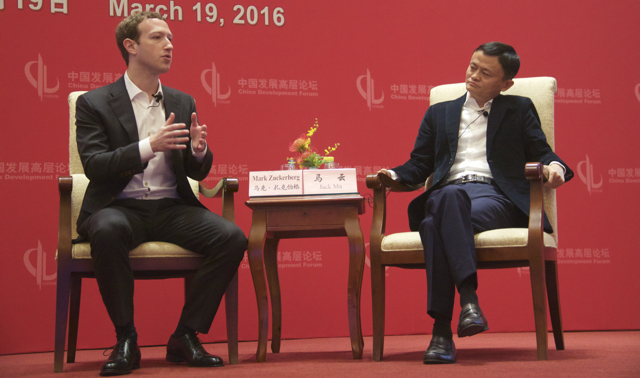
Despite the oft-discussed differences between East and West, China and the U.S., Alibaba Group Executive Chairman Jack Ma and Facebook CEO Mark Zuckerberg do agree on at least one thing: Virtual reality technology is going to be huge.
Speaking on Saturday during a session at the annual China Development Forum, where global business leaders and Chinese officials meet to discuss the world’s second-largest economy, the two Internet moguls emphasized the growingimpact that VR will have on society in coming years.
“Every 10 or 15 years, there are new computer platforms that are more natural, immersive and help us interact in the world every day,” Zuckerberg said. “I think that will be augmented, or virtual, reality.”
According to business intelligence firm Markets and Research, the global virtual reality market will nearly double by 2019 asVR hardware and software isadopted for various uses in healthcare, entertainment and the military.Salesof head-mounted VR displays for consumers are expected to grow 49 percent over the next five years.
Zuckerberg’s comments coincided with an announcement earlier in the week from Alibaba that it was planning to use virtual reality to enhance the shopping experience of its 407 million users. Thee-commerce giantlaunched a new research and development laboratory—GnomeMagic Lab—to focus on VR e-commerce applicationsas well as others inonline games and video streaming. Alibaba said it has created three-dimensional visuals for hundreds of products and that it will issue standards for merchants to create VR-enabled shopping options, the company said in a release. VR experiences for music and videos are being developed as well.
But where a trained engineer such as Zuckerberg, who runs America’s largest social network,may like to focus on the technology itself, Ma,a former teacher who went on to found China’s largest e-commerce company,said he’s more interested in its usefulness to consumers.
“When I think of the VR, I think how can I help those women and girls shopping [for] their things on our site easier. Get them [to] buy these things easier, quicker and nicer,” he said. “And how can we use this VR tech to help the sellers to sell their things in a very friendly way.”
Zuckerberg said Facebook’s VR headset, Oculus, will ship this year. But he recognized the long timeframe typically associated with the adoption of new and unfamiliar technologies. He noted that the first smartphone was made in 2003 but it took 10 years before there were as many as a billion people using them. VR’s uptakewill be similar, he said.
“In the beginning it will be small units, and there will be five to 10 years before becoming really a big thing,” said Zuckerberg. “But if you want to start with shipping something, and let a lot of people enjoy it, I think it is going to be in 2016.”
When asked if Alibaba would sell the Oculus on its Tmall.com platform, Ma replied, “Yes, of course.”
Another big part of Saturday’s session focused on artificial intelligence. Zuckerberg pointed to recent news that a software program developed by Google had beaten one of the world’s best Go players. He said he expected a significant amount of progress in this field over the next five to 10 years as well. The day may come when computers understand the workings of the human senses, and even dreams, “better than people can,” Zuckerberg said.
Machines will be better drivers, too. “There is no reason why a computer ‚Ķ that doesn’t sleep, that always pays attention, that has good memory, can be a lot safer to drive the car than people,” he said.
Ma agreed that computers will no doubt be smarter than people in the years to come, but he stressed that they would lack the reason that comes along with the human mind. We should “use machines as an innovative, effective way to solve human problems [such as] diseases, climate change and poverty,” he said, adding that AI technology will play a particularly important role in the life sciences sector.
“People are going to live longer and healthier [lives],” Ma said. “That is because of computing and because of data.”
The two executives also bantered about the differences between Chinese and American culture. Mareckoned thatout of 100 Chinese people, probably 80 speak at least some English. Not so in the U.S. He estimated maybe as few as two Americans out of 100 can speak even a few words of Mandarin.
Zuckerberg, whohas been studying thelanguagefor several years and is married to an American-born Chinese, is one of the exceptions. “There are always discussions about the superiority of West and East, but I saw Mark being very successful in marrying the best of two cultures,”Ma said.
Facebook’s founder added that he was impressed by the high population of engineers in China. “I think China got it right by emphasizing this for a long time,” he said.




